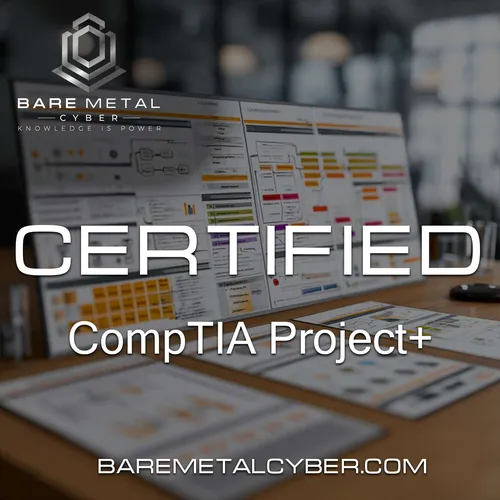
Certified - CompTIA Project+ Audio Course
The Project+ Audio Course is a complete audio series built around the CompTIA Project+ PK0-005 exam objectives. Each episode delivers clear explanations, practical examples, and glossary coverage to help you understand project management concepts, tools, life cycle phases, and IT governance. Produced by BareMetalCyber.com, it’s designed to guide you from orientation through exam readiness with professional, exam-focused instruction.
- Update frequency
- every day
- Average duration
- 12 minutes
- Episodes
- 88
- Years Active
- 2025

Episode 48: Project Initiation: Charter, Objectives, and Scope
In this episode, we break down the project initiation phase starting with the creation of the project charter. You’ll learn how the charter outlines objectives, success criteria, and preliminary scop…

Episode 47: Client Constraints and Preexisting Agreements
This episode examines how client-imposed constraints and existing agreements can shape a project before work begins. Constraints may include budget limits, fixed deadlines, compliance requirements, o…

Episode 46: Discovery Phase: Business Case and ROI Analysis
This episode begins Domain 2 by focusing on the discovery or concept preparation phase of a project. We explain how the business case establishes the rationale for undertaking the project, defining t…

Episode 45: Recap of Domain 1: Project Concepts You Must Know
This episode consolidates the key concepts from Domain 1 of the PK0-005 exam, reinforcing your understanding of project definitions, methodologies, change control, risk, issue management, scheduling,…

Episode 44: Action Items, Follow-ups, and Effective Meeting Closure
In this episode, we explain how to transition meetings into actionable outcomes. You’ll learn how to document action items clearly, assign ownership, and set deadlines for completion. The PK0-005 exa…

Episode 43: Meeting Roles, Agenda Design, and Timeboxing
This episode focuses on structuring meetings for maximum productivity. We define key roles such as facilitator, scribe, and attendees, explaining how each contributes to meeting effectiveness. We’ll …

Episode 42: Meeting Types: Collaborative, Informative, Decisive
In this episode, we break down the main categories of project meetings and their distinct purposes. Collaborative meetings, like workshops and brainstorming sessions, encourage joint problem-solving.…

Episode 41: Maintaining and Securing Project Communication Records
This episode covers the practices for preserving and protecting project communication records, which are essential for compliance, traceability, and knowledge management. We’ll discuss maintaining ar…

Episode 40: Overcoming Communication Barriers: Time, Culture, Tech
This episode addresses common challenges to effective communication in projects, including time zone differences, cultural variations, and technological limitations. We’ll discuss strategies such as …

Episode 39: Communication Methods: Synchronous, Asynchronous, Formal
In this episode, we examine different communication methods and their application in project environments. Synchronous methods, like meetings and calls, occur in real time, while asynchronous methods…

Episode 38: Verification, Validation, and Post-Implementation Support
This episode clarifies the difference between verification and validation, two concepts frequently tested on the PK0-005 exam. Verification ensures that deliverables meet documented specifications, w…

Episode 37: Testing Types: Unit, Regression, UAT, Stress, Smoke
In this episode, we review the various testing methods used to verify deliverables before project completion. Unit testing checks individual components, while regression testing ensures that new chan…

Episode 36: SLAs, KPIs, and Variance Analysis for Projects
This episode focuses on the measurement tools and performance indicators that help project managers track progress and maintain accountability. We define Service-Level Agreements (SLAs) as contractua…

Episode 35: Quality vs. Performance: Understanding the Distinctions
This episode examines the difference between quality management and performance management in projects. Quality focuses on meeting requirements and delivering outputs that are fit for purpose, while …

Episode 34: Sprint Planning, Critical Path, and Rebaselining Techniques
In this episode, we link Agile sprint planning with traditional scheduling concepts like critical path analysis. You’ll learn how sprint planning defines goals, selects backlog items, and allocates t…

Episode 33: Estimating Resources, Buffers, and Story Points
This episode covers estimation techniques for project resources, contingency buffers, and Agile story points. You’ll learn how to determine resource requirements for each activity by considering comp…

Episode 32: Successor and Predecessor Relationships in Detail
In this episode, we focus on the four primary types of task relationships: finish-to-start, start-to-start, finish-to-finish, and start-to-finish. We’ll define each relationship type and explain how …

Episode 31: Dependencies: Hard Logic, Soft Logic, Internal, External
This episode explains the different types of task dependencies that influence project scheduling. Hard logic, or mandatory dependencies, represent relationships that cannot be altered, such as comple…

Episode 30: Milestones and Activity Identification in Project Scheduling
This episode introduces the first steps of project scheduling, beginning with identifying milestones and defining activities. We’ll explain how milestones represent key progress points that help trac…

Episode 29: Workarounds, Documentation, and Final Outcomes
In this episode, we explore temporary solutions—known as workarounds—that allow projects to continue despite unresolved issues. You’ll learn how workarounds differ from permanent fixes and when they …